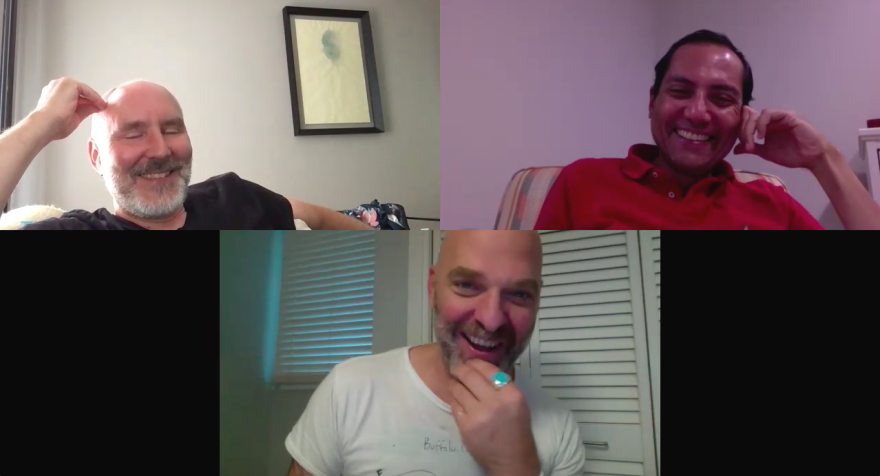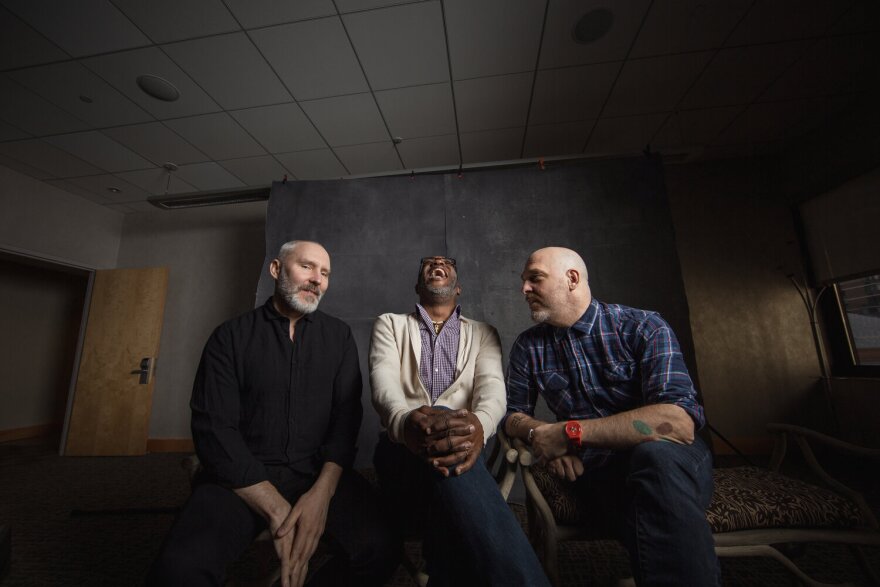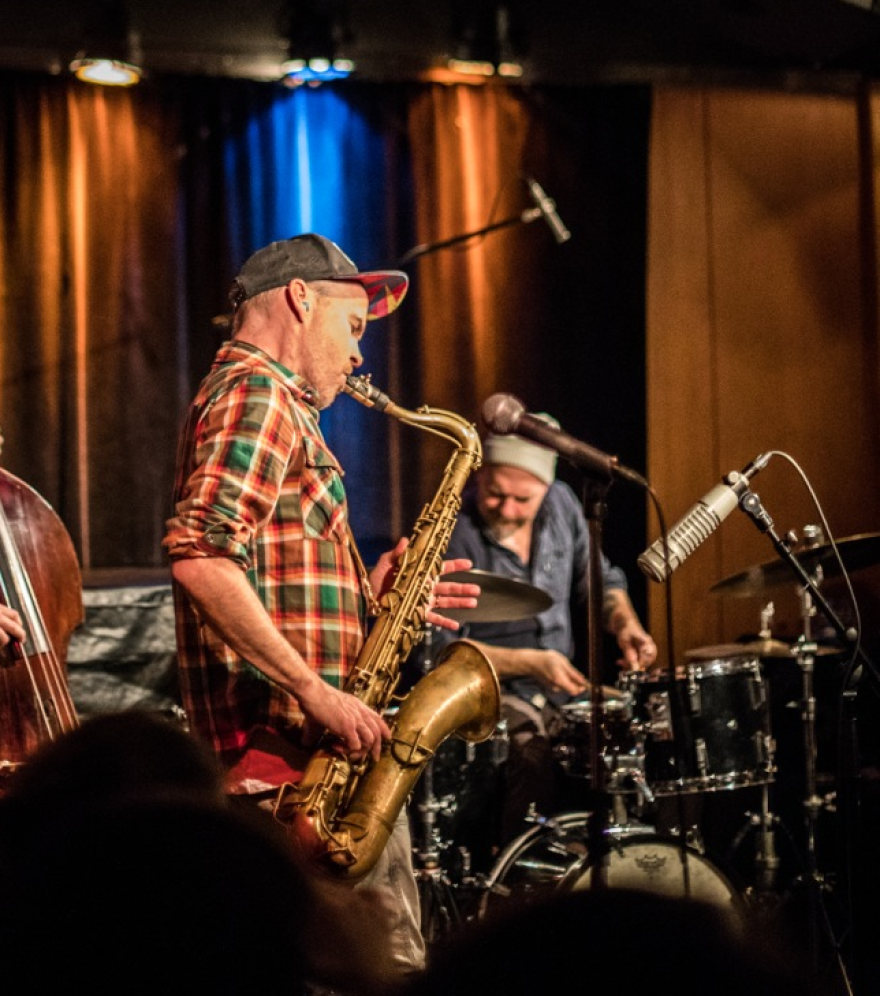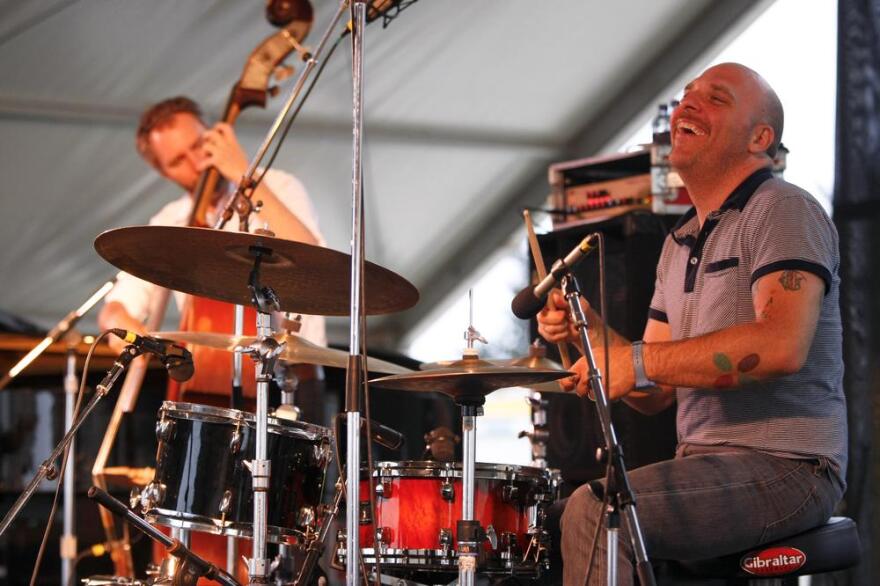Four years ago, The Bad Plus made the startling announcement that its charter pianist, Ethan Iverson, had left the band, and that his replacement would be Orrin Evans.
WBGO was the first to report that story, which also yielded a 2018 episode of Jazz Night in America focused on Evans’ express-lane acclimation to the language and rigors of the band. Evans made two well-regarded albums with The Bad Plus: Never Stop II, released in 2018, and Activate Infinity, which arrived the following year.
“I’ve seen them play live perhaps more than any other band and was so knocked out when they asked me to join,” Speed says via email. “Reid and Dave are not only good friends but also my favorite musicians, and what a dream to get play their music together with Ben Monder.”
As for the breakup with Evans, Anderson and King characterize it as amicable, if hardly painless — a depiction that the pianist seconds. “Let me first say that those are two brothers I love, and my leaving wasn’t based on anything personal or, you know, any beef,” Evans tells WBGO, speaking on Monday night from his home in Philadelphia.
“When you join an organization like The Bad Plus, it’s like a merry-go-round that never stops,” he adds. “Or, another way to look at it: I grew up watching my sister and her girlfriends playing Double Dutch. And you’re waiting to jump in, waiting to jump in. And once you get in, you’ve got to keep jumping.”
The pandemic pause, and its call to reevaluate priorities, gave Evans the motivation to jump out — a choice driven largely by a desire to focus on his own projects. (His new quartet album, The Magic of Now, was featured in Take Five earlier this month.)
Of course, that created a crucial opening in The Bad Plus, and in some ways a fresh opportunity. On Monday afternoon I spoke with Anderson and King about that calculus, the inherent promise of their new band mates, and the implications of a pianoless lineup. Here is a lightly edited transcript of our conversation.

First of all, congratulations on another phase in the life of this band. I guess I wanted to start by asking about the timeline: when was it clear that the Orrin Evans era was coming to a close? And how did the conversation evolve?
Dave King: You mind if I take this for a second, Reid?
Reid Anderson: It would be great if you took this one.
King: Really, Nate, one by one we just want to get everyone who played on David Bowie’s BlackStar into the band. So we’re starting with Ben.
Got it. [Laughs]
King: Actually, over the COVID year-and-a-half or whatever, we would regularly be conversing, and one of the things we were talking about quite a bit with Edition, the label that we’re on, was this idea of expanding the band for the next record. So, in a way, we’d made this statement, where we switched the pianist in The Bad Plus with really no hiccups. The fans loved it, and we stood behind the records. So we thought it would be interesting to come out of the COVID thing with a quartet version for an album. And we were tossing ideas around, and over the course of getting new music going, it just started to feel like Orrin wanted to put as much energy as he could into his own projects. Of course, he’s been established for years; everybody knows that. But I think he was wanting to parlay whatever momentum he got from being with us into more and more of his own thing as a leader. And that led to real discussions about what you can really expect anyone to be dealing with when they join a band that’s that solid of an identity after 18 years.
Right.
King: So we were taping some streaming shows. And there was an emotional moment of him just saying, “You know, I really think I have to go back and focus on my own projects.” And at first, it’s like: “Oh, my God, again?” But then you just have to say to each other, “Come on, this is an old friend of ours. The interpersonal was completely always cool and amazing. It was just more like, “He needs to do that, and we can’t get in the way of that.” And then it became like, “You know what? Let’s just unapologetically call it what it is. This project started with Reid and I. We formed this band. It’s like, the writing, the way we go about the process, the artwork, everything. It had a lot to do with the aesthetic of how Reid and I have partnered since we were 15 years old. And then because we had talked about adding a guitar player, “What if we went all the way, and just changed the voice of the instrument from piano?”
I want to talk about that. But before we do — just to build on what you were saying, because I know how long and how close this relationship has been with Orrin — was this something that manifested gradually? Or were these conversations happening even when you guys were really hitting?

Anderson: I think it built over time. Initially, Orrin certainly wanted to do it, and I’m not speaking for him, but I think he was proud of the music we made, as much as we were. But we were talking amongst ourselves about what a kind of impossible position it would put anyone in, joining — especially right after this 18-year establishment of the thing that is The Bad Plus. And so, there was a lot of pressure on everybody. It couldn’t fail, you know? It couldn’t fall on its face. That would have been just devastating for us. But also, Orrin had to step into this situation that he didn’t create. He didn’t conceive of the band or grow with it over 18 years. He was just thrown in. And I think he comported himself really well. He played great, and I think the honest truth is that it just wasn’t something that he really saw himself continuing doing. And that’s one hundred percent OK. It opened up this opportunity for us as well, so I think everybody kind of got the best outcome in the end. Because, you know, it’s intense, all the time we spend on the road. And it’s a lot of committed, memorized music. It’s a lot of notes. And it takes a lot of energy. And you’ve got to be 100 percent. And in the end, he wasn’t — for very understandable reasons.
That raises a question: One of the words that always comes to mind when I think about this band is “commitment.” When The Bad Plus is really hitting, it does seem kind of impossible to also maintain a bandleading career.
King: It’s almost impossible even to do a sideman thing. And that’s kind of all I’m saying about Orrin, and why it’s so understandable. He was an into-the-band guy, you know what I mean? But the realities of what a band takes — that’s why it’s so rare in jazz. I mean, ultimately, that’s what we’re talking about here, is that type of commitment is why you only see a handful of groups, and barely any that last that long playing that many tunes. And so you could say, like we said, “Well, you have to hand it to Iverson, man. I mean, he was in there for 18 years dealing on the highest level.” It’s the band we formed together. So with Orrin, you can step back from the emotional part: “Oh, dang, I really loved Orrin, and I loved playing that stuff, he sounded amazing to me.” And we pulled off the thing, which is: the piano doesn’t lead The Bad Plus. There you go. This is a collective. But then the realities of: “Oh my God, here we come again with a new album.” Now they’re gonna have to learn all this music again. There’s going to be another person involved. There’s a whole other voice going on there, guitar and piano. That’s why we started to look at it much more reasonably, like: how much can you actually ask of someone, and then especially someone you love, and you care about, and someone that has the right to be having their own s–t when they want to do it? And can’t be told like, “Hey, buddy, you can’t do your trio and Captain Black for the next nine months because we’re going to f—-ng be everywhere.”
Well, I have to hand it to you, because after it was clear that Orrin was leaving, I thought about another piano chair in this band, and it was a difficult thing to wrap my head around, because the bar is set so high. It was an amazing degree of difficulty that Orrin managed. Then when I saw your solution at this moment, it was like, “Oh, this makes perfect sense.” Because these guys are your peers. You have such established relationships with them — and changing the sound of the band also changes expectations around what continuity sounds and feels like.
King: Correct. Exactly.
Anderson: Well, also, from our perspective, it’s never been about having a piano or not having a piano, really. It’s about relationships — and not to say we wouldn’t play with somebody who we don’t have a history with. But especially in both of these transitions now, that’s been a primary consideration. We want to play with people who we do have relationships with musically and personally. And, you know, it’s important to us.
King: Being able to go out and play your own music and have a band that people have followed for many, many years is an incredible gift. And the amount that we’ve been able to do it with this philosophy of, that it really is a concept. It’s conceptual thinking. It’s band thinking. It’s a way of improvising together that doesn’t have a hierarchy in the instrument. You know, all these things you know, Nate, from the history of the band. That’s a special thing. And to be able to look at each other and say, “You know what? Let’s just be honest, this is where that sort of engine room exists. And if we get some people that we love to play with, and they know what the score is?” Then that’s just on the table. The thing is this: do you want to do it or not?
I know that if we were to map the relationships, it crisscrosses all over. But of course, the thing that comes most readily to my mind is Broken Shadows, with the two of you plus Chris and Tim Berne. Being in that band, touring and recording — how does that inform this, if at all?

Anderson: For me personally, it doesn’t so much, as far as the decision to have Chris in the band goes. I think that’s more based on long-term relationships and a long-term knowledge of his sound. Dave has this band, The Dave King Trucking Company, that Chris plays in. And years ago, I remember hearing them with Chris, when he first joined the band. And his sound really resonated with me. Also, to say Broken Shadows had a big influence on this decision kind of excludes Tim, and it wasn’t about choosing Chris over Tim, or anything like that. It was more that having a tenor saxophone was more aligned with what we could hear in terms of our music right now.
King: And the familiarity is real. One of the main things Reid and I discussed when we started talking about people is that we can’t do a bring-in-some-guests thing. It’s more like: This is what it is for now, we’ll see where it goes. But who would be able to commit, that we feel like we know as people? So at first we’re making these lists of like people it’ll be fun to play with. We so enjoyed our time with Joshua Redman, and that sound we made, which we again felt like sounded like The Bad Plus, no matter who you brought in. Somehow it absorbs this idea, and it becomes that sound again. So we were excited about a horn, a saxophone. We talked about trumpet a little bit, too. I mean, we were tossing out ideas. And it just became like: Ben Monder, the way that he sounds, who he is, how we feel comfortable personally. It just clicked, makes so much sense. And then we just looked at each other and said: “The horn player’s gotta be Chris Speed.” You know, he’s like that type of person who doesn’t have that sort of saxophone-macking kind of personality. He’s very thoughtful, very conceptual the way that he plays. And he loves The Bad Plus. He’s just a guy that’s seen us a hundred times. I don’t know if anyone has seen us as much as he has. But just the experience of touring with Broken Shadows, the fact that I’ve been in Chris’s trio for over a decade now, that comfort zone is really what we craved as well as the highest-level musicianship. And those guys can play anything. Thank God they were both very enthusiastically into the idea.
You just mentioned Ben — and I have to ask about his sonic palette. The Bad Plus has always been heavy, in a sense, but he can actually get heavy with his effects and distortion. Does it make you think: “Oh man, now we can really bring the hammer down”?
King: It does, for me!
Anderson: Definitely.

King: It’s insanely exciting with him, just like you put it. Like, you can get some brilliant guitar players out there — Julian Lage, people like that. But with Ben, the technical ability aside, his sound and how much range we would have, between that sort of ethereal nature of his playing and then the aggressive nature. When he turns it on, as we all know he can, it’s got almost like a shredding kind of metal thing. That’s very exciting, too. So I can’t wait. I’m kind of chomping at the bit, relooking at all the new music, and hearing it with Ben’s sound in mind, has been very exciting.
How much are you guys writing new stuff with these guys in mind — and how much are you looking back over the catalog and figuring out, “OK, this one is great for reorchestrating”?
Anderson: We’re going to record at the end of September, so obviously there’s a lot of thinking about that and generating new music. We always think in those terms, like who’s going to be playing this music? And so that’s a pretty natural shift to make in your mind. And then the older stuff, yeah — there are a couple things that are very pianistic and that would be hard to replicate on another instrument. But for the most part, I think you can adapt 90 percent of the old repertoire to pretty much anything, you know.
Yeah.
King: We’re compiling a list of things we definitely want to try from the old book, between my compositions and Reid’s, just like we did with Orrin. Reid and I are bringing in a bunch of new music. And the idea is also to try and track some older things as well — to kind of dole those things out until the new album comes out. Like, “Hey, here’s ‘Big Eater,’ played by Ben and Chris.” That’s very exciting to me. And so, when we begin rehearsing next week, that’s kind of the concept: alongside getting this whole new record together, looking at the old book and making sure we can play a bunch of stuff live. That’s the whole plan, is to play as much as we can from the old stuff and all new stuff as well.
So you’re playing Yoshi’s in late September. Is that prior to the studio?
Anderson: Yeah, we’re going in right after that. So at least we can get some live playing under our belt before we record.
Well, this is something to look forward to. As soon as I saw those names, it just made sense.
King: That’s good to hear.
Anderson: Yeah, I think that’s what it was for us, too. In the end, it’s like, “Of course it’s these guys.” That was just the clearest path, it really came together in a very organic way. It almost had a will of its own.
I guess I have one more question for you. And it pertains to the album and what it represents. Last time, when Orrin came in, it was such big news. And you titled the album ‘Never Stop II,’ which felt to me like a vow of continuity. You were saying: “This is still what you know. It’s just the sequel.”
King: Yeah.
And it felt like you guys were reassuring the fan base — as well as yourselves. Like, “This can still go on.” And I wonder how the messaging is different for you this time around. Do you feel like you have less to prove? More to prove?

King: One of the most refreshing realizations that Reid and I had together recently was that in this post-covid Wild West, you’re free to just say “F–k it.” And in a way, we’re sort of unapologetically going, like, “You know what? The Bad Plus is what we say it is.” We know what we’re capable of doing. With all humility, we’re excited how this is going to sound. We’re hoping everybody comes with this ride that just continues to grow. And this is the time, I think, to just be able to say unapologetically, that we’re not reinventing the band anymore. This is the way it is. These guys are showing up, and they’re going to show up and throw down, and this is what The Bad Plus is now. You know what I mean? There isn’t this whole, like, handwringing. Like, the first time, of course — it’s like, “Oh, s–t, here we come with this new pianist.” All of the pressures that go with that. We did it! Now it’s like, “OK, you know, and then this zither player is going to join us,” you know? I mean, at this point, what do you what? We’re going to have a bunch of new music, it’s coming from me, it’s coming from Reid. Of course it’s going to sound like the f—ng Bad Plus! You know what I mean?
Anderson: For sure. I mean, the whole ethos of the band is really just trying to just play some committed, good, thought-provoking, energetic music. And that’s enough. We can’t really think about any of the other factors. Do we have to prove ourselves again? I don’t know. I mean, I don’t think so, but we’re going to bring just as much energy and passion to everything moving forward. We have this kind of unique experience also of, you know, Dave and I have this long-term commitment to this project and this aesthetic and this music. Of course, we’re involved in other things. But there is something very singular about The Bad Plus. And we very well know what that secret sauce is between the two of us. We have a very good understanding of what that is. So we have no trepidation about what that’s going to be moving forward.
King: That’s kind of what I mean. It’s like, we know how to do this thing — and like, come on, Ben Monder and Chris Speed! I mean, these aren’t like some random guys…
Anderson: I don’t think anybody’s going to be disappointed.
King: It’s like, “Yeah, we can do this.” That’s the attitude they’ve been coming in with. Let’s go.







More Stories
Eric Gales՛s new album 2025, releases single with Buddy Guy & Roosevelt Collier: Video, CD cover
I usually practice with the door open. I always played like that, hoping someone would walk by and discover me: Ahmad Jamal once confessed: Video, Photos
Terry Riley. A landmark reissue of one of the most important figures in 20th-century music: Videos, Photos